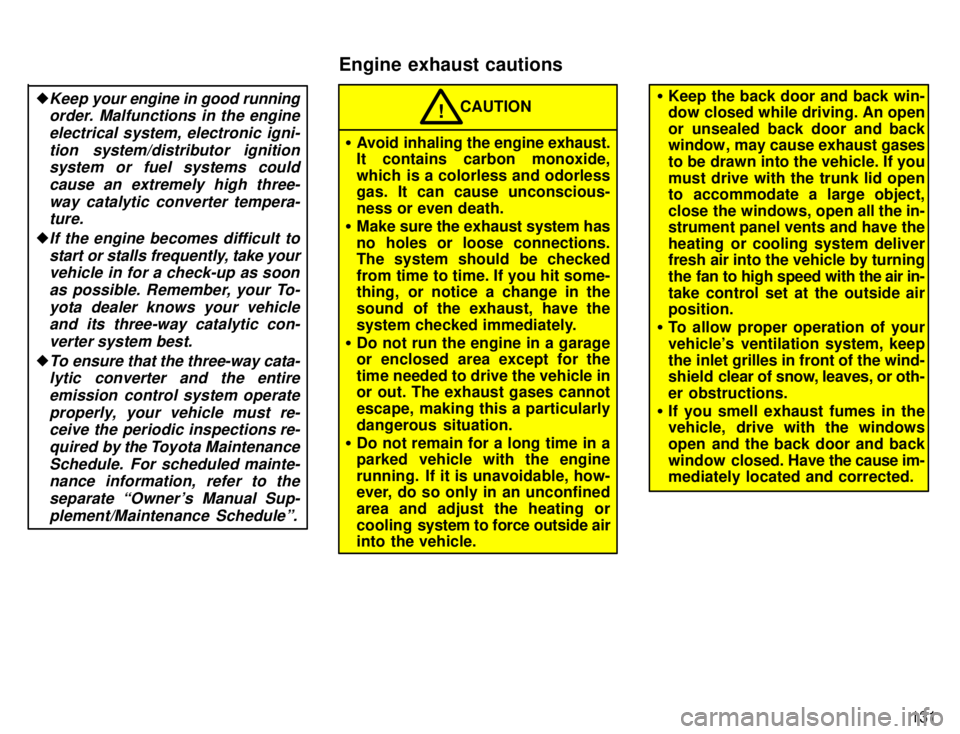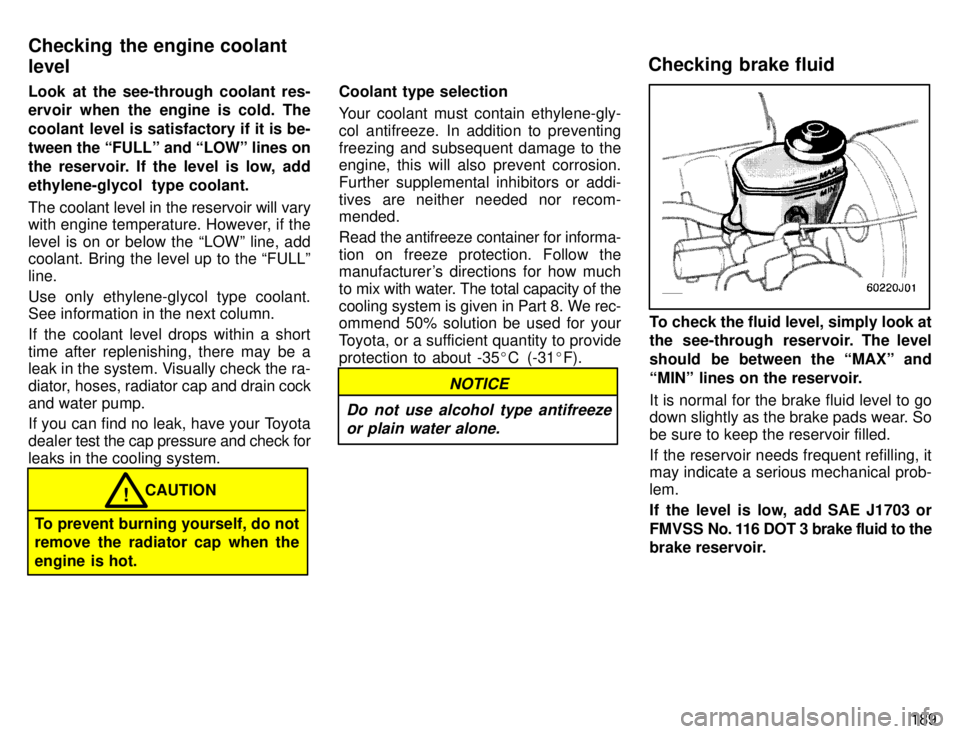1996 TOYOTA 4RUNNER cooling
[x] Cancel search: coolingPage 63 of 217

60
The gauge indicates the engine cool-
ant temperature when the ignition
switch is on. The engine operating
temperature will vary with changes inweather and engine load.
If the needle moves into the red zone, your engine is too hot. If your vehicle over-
heats, stop your vehicle and allow the en-
gine to cool.
Your vehicle may overheat during severe operating conditions, such as: � Driving up a long hill on a hot day.
� Reducing speed or stopping after high
speed driving. �
Idling for a long period with the air con-
ditioning on in stop-and-go traffic.
� Towing a trailer.
NOTICE
�Do not remove the thermostat in
the engine cooling system as this
may cause the engine to overheat.
The thermostat is designed to con-trol the flow of coolant to keep the
temperature of the engine within the specified operating range.
�Do not continue driving with anoverheated engine. See If yourvehicle overheatsº in Part 4.
The tachometer indicates engine
speed in thousands of rpm (revolu-
tions per minute). Use it while driving
to select correct shift points and to
prevent engine lugging and overrev-ving.
Driving with the engine running too fast
causes excessive engine wear and poor
fuel economy. Remember, in most cases
the slower the engine speed, the greater
the fuel economy.
NOTICE
Do not let the indicator needle get into the red zone. This may cause
severe engine damage.
Tachometer
Engine coolant temperature gauge
Page 121 of 217

11 8Heating
For best results, set controls to:
Fan speed ÐAny setting except OFFº
Temperature Ð Towards WARM
(red zone)
Air intake ÐFRESH (outside air)
Air flow ÐFLOOR
Air conditioning ÐOFF
� For quick heating, select recirculated
air for a few minutes. To keep the win-
dows from fogging, select fresh after the vehicle interior has been warmed.
� Press the A/Cº button on for dehumid-
ified heating.
� Choose floor/windshield air flow to heat the vehicle interior while defrost-ing or defogging the windshield. Air conditioning For best results, set controls to:
Fan speed ÐAny setting except OFFº
Temperature Ð Towards COLD
(blue zone)
Air intake ÐFRESH (outside air)
Air flow ÐPANEL
Air conditioning ÐON� For quick cooling, move the air intake
selector to recirculate for a few min-utes.
Ventilation
For best results, set controls to:
Fan speed ÐAny setting except OFFº
Temperature Ð Towards COLD
(blue zone)
Air intake ÐFRESH (outside air)
Air flow ÐPANEL
Air conditioning ÐOFF
Defogging The inside of the windshield For best results, set controls to:
Fan speed ÐAny setting except OFFº
Temperature Ð Towards WARM
(red zone) to heat; COLD (blue zone) to
cool
Air intake ÐFRESH (outside air)
Air flow ÐWINDSHIELD
Air conditioning ÐON
On models with air conditioning, moving the air flow control lever to this position
turns on the air conditioning. This is to
clear up the front view more quickly. Moving the air flow control lever to anoth-
er position turns off the air conditioning. � On humid days, do not blow cold air on
the windshieldÐthe difference be- tween the outside and inside tempera-
tures could make the fogging worse.
Page 134 of 217

131
�Keep your engine in good running
order. Malfunctions in the engine
electrical system, electronic igni-tion system/distributor ignitionsystem or fuel systems could
cause an extremely high three-way catalytic converter tempera-ture.
�If the engine becomes difficult to
start or stalls frequently, take your
vehicle in for a check-up as soon
as possible. Remember, your To-yota dealer knows your vehicleand its three-way catalytic con-
verter system best.
�To ensure that the three-way cata-lytic converter and the entire
emission control system operateproperly, your vehicle must re-ceive the periodic inspections re-
quired by the Toyota Maintenance
Schedule. For scheduled mainte- nance information, refer to the
separate Owner's Manual Sup-
plement/Maintenance Scheduleº.
CAUTION!
� Avoid inhaling the engine exhaust.
It contains carbon monoxide,
which is a colorless and odorless
gas. It can cause unconscious- ness or even death.
� Make sure the exhaust system has
no holes or loose connections. The system should be checked
from time to time. If you hit some-
thing, or notice a change in the
sound of the exhaust, have the
system checked immediately.
� Do not run the engine in a garage
or enclosed area except for the
time needed to drive the vehicle in
or out. The exhaust gases cannot
escape, making this a particularlydangerous situation.
� Do not remain for a long time in a
parked vehicle with the engine
running. If it is unavoidable, how-
ever, do so only in an unconfined
area and adjust the heating or
cooling system to force outside air
into the vehicle.
� Keep the back door and back win-
dow closed while driving. An open
or unsealed back door and back
window, may cause exhaust gases
to be drawn into the vehicle. If you
must drive with the trunk lid open
to accommodate a large object,
close the windows, open all the in-
strument panel vents and have the
heating or cooling system deliver
fresh air into the vehicle by turning
the fan to high speed with the air in-
take control set at the outside air position.
� To allow proper operation of your
vehicle's ventilation system, keep
the inlet grilles in front of the wind-
shield clear of snow, leaves, or oth-
er obstructions.
� If you smell exhaust fumes in the
vehicle, drive with the windows
open and the back door and back
window closed. Have the cause im-
mediately located and corrected.
Engine exhaust cautions
Page 135 of 217

132
FUNCTIONS OF ENGINE OIL
Engine oil has the primary functions of lu-
bricating and cooling the inside of the en-
gine,
and plays a major role in maintaining
the engine in proper working order. ENGINE OIL CONSUMPTION
It is normal that an engine should con-
sume some engine oil during normal
engine operation. The causes of oil
consumption in a normal engine are
as follows. � Oil is used to lubricate pistons, piston
rings and cylinders. A thin film of oil isleft on the cylinder wall when a piston
moves downwards in the cylinder.
High negative pressure generated
when the vehicle is decelerating sucks
some of this oil into the combustion
chamber. This oil as well as some part
of the oil film left on the cylinder wall is
burned by the high temperature com-
bustion gases during the combustionprocess. �
Oil is also used to lubricate the stems
of the intake valves. Some of this oil is
sucked into the combustion chamber
together with the intake air and is
burned along with the fuel. High tem-perature exhaust gases also burn the
oil used to lubricate the exhaust valve stems.
The amount of engine oil consumed
depends on the viscosity of the oil, the
quality of the oil and the conditions
the vehicle is driven under. More oil is consumed by high-speed driv-
ing and frequent acceleration and decel- eration.
A new engine consumes more oil, since
its pistons, piston rings and cylinder walls
have not become conditioned.
When judging the amount of oil con-
sumption, note that the oil may be-come diluted and make it difficult to
judge the true level accurately.
As an example, if a vehicle is used for re-
peated short trips, and consumes a nor- mal amount of oil, the dipstick may not
show any drop in the oil level at all, even after 1000 km (600 miles) or more. This is because the oil is gradually becoming
diluted with the fuel or moisture, making it
appear that the oil level has not changed. The diluting ingredients evaporate out
when the vehicle is then driven at high
speeds, as on an expressway, making itappear that oil is excessively consumed
after driving at high speeds.
IMPORTANCE OF ENGINE OIL LEVEL CHECK
One of the most important points in proper vehicle maintenance is to keep the engine
oil at the optimum level so that oil function
will
not be impaired. Therefore, it is essen-
tial that the oil level be checked regularly.
Toyota recommends that the oil level bechecked every time you refuel the vehicle.
NOTICE
Failure to check the oil level regular- ly could lead to serious engine
trouble due to insufficient oil.
For detailed information on the oil level
check, see Checking the engine oil levelº
in Chapter 7-2.
Facts about engine oil consumption
Page 192 of 217

189
Look at the see-through coolant res-
ervoir when the engine is cold. The
coolant level is satisfactory if it is be-
tween the FULLº and LOWº lines on
the reservoir. If the level is low, add
ethylene-glycol type coolant.
The coolant level in the reservoir will vary
with engine temperature. However, if the
level is on or below the LOWº line, add
coolant. Bring the level up to the FULLº line. Use only ethylene-glycol type coolant. See information in the next column.
If the coolant level drops within a short
time after replenishing, there may be a
leak in the system. Visually check the ra-
diator, hoses, radiator cap
and drain cock
and water pump.
If you can find no leak, have your Toyota
dealer test the cap pressure and check for
leaks in the cooling system.
CAUTION!
To prevent burning yourself, do not
remove the radiator cap when the
engine is hot. Coolant type selection
Your coolant must contain ethylene-gly-
col antifreeze. In addition to preventingfreezing and subsequent damage to the
engine, this will also prevent corrosion. Further supplemental inhibitors or addi-
tives are neither needed nor recom- mended.
Read
the antifreeze container for informa-
tion on freeze protection. Follow the
manufacturer 's directions for how much
to mix with water. The total capacity of the
cooling system is given in Part 8. We rec- ommend 50% solution be used for your
Toyota, or a sufficient quantity to provideprotection to about -35 �C (-31 �F).
NOTICE
Do not use alcohol type antifreeze or plain water alone.
To check the fluid level, simply look at
the see-through reservoir. The level
should be between the MAXº and
MINº lines on the reservoir. It is normal for the brake fluid level to go
down slightly as the brake pads wear. So be sure to keep the reservoir filled.
If the reservoir needs frequent refilling, it may indicate a serious mechanical prob- lem.
If the level is low, add SAE J1703 or
FMVSS No. 116 DOT 3 brake fluid to the
brake reservoir.
Checking the engine coolant level
Checking brake fluid
Page 197 of 217

194WHEN TO REPLACE YOUR WHEELS
If you have wheel damage such as
bending, cracks or heavy corrosion,
the wheel should be replaced.
If you fail to replace damaged wheels, the
tire may slip off the wheel or they may cause loss of handling control. WHEEL SELECTION
When replacing wheels, care should
be taken to ensure that the wheels are
replaced by ones with the same load
capacity, diameter, rim width, and off-set.
Correct
replacement wheels are available
at your Toyota dealer.
A wheel of a different size or type may ad-
versely affect handling, wheel and bear-
ing life, brake cooling, speedometer/
odometer calibration, stopping ability,
headlight aim, bumper height, vehicle
ground clearance, and tire or snow chain clearance to the body and chassis. Replacement
with used wheels is not rec-
ommended as they may have been sub-jected to rough treatment or high mileageand could fail without warning. Also, bent
wheels which have been straightened
may have structural damage and there-
fore should not be used. Never use an in-
ner tube in a leaking wheel which is de-
signed for a tubeless tire. �
After driving your vehicle the first 1600
km (1000 miles), check that the wheel
nuts are tight.
� If you have rotated, repaired, or
changed your tires, check that the
wheel nuts are still tight after driving
1600 km (1000 miles).
� When using tire chains, be careful not
to damage the aluminum wheels.
� Use only the Toyota wheel nuts and
wrench designed for your aluminumwheels.
� When balancing your wheels, use only
Toyota balance weights or equivalent
and a plastic or rubber hammer.
� As with any wheel, periodically checkyour aluminum wheels for damage. If
damaged, replace immediately.
Aluminum wheel precautions
Replacing wheels
Page 210 of 217

+20 -15207
5VZ-FE engine
Generator belt 100 + 20
Air conditioning compressor belt 100 + 20
Power steering
pump belt 100
ENGINE LUBRICATION
Oil capacity (drain and refill), L (qt., Imp. qt.): 3RZ-FE engine With filter 5.4 (5.7, 4.8)
Without filter 4.7 (5.0, 4.1)
5VZ-FE engine With filter 5.2 (5.5, 4.6)
Without filter 4.9 (5.2, 4.3) Oil grade:
API SH, Energy-Conserving IIº multi-
grade engine oil or ILSAC multigrade
engine oil is recommended.
Recommended oil viscosity (SAE):
COOLING SYSTEM
Total capacity, L (qt., Imp. qt.): 3RZ-FE engine
With rear heater 11.0 (11.6, 9.7)
Without rear heater
10.0 (10.6, 8.8)
5VZ-FE engine With rear heater
9.0 (9.5, 7.9)
Without rear heater 8.0 (8.5, 7.0) Coolant type:
With ethylene-glycol antifreeze (Do not use alcohol type.)
BATTERY ÐMaintenance type battery Specific gravity reading at 20 �C (68 �F):
1.280 Fully charged
1.180 Half charged
1.080 Discharged
ÐNon-maintenance battery Open voltage* at 20 �C (68 �F):
12.7 V Fully charged
12.3 V Half charged
11.9 V Discharged
*: Voltage that is checked 20 minutes af-
ter the key is removed with all the lights
turned off
Charging rates: Non-maintenance battery 5 A max. Maintenance type batteryQuick charge 15 A max.
Slow charge 5 A max.
CLUTCH
Pedal freeplay, mm (in.):
5Ð15 (0.2Ð0.6)
Fluid type:
SAE J1703 or FMVSS No. 116 DOT 3